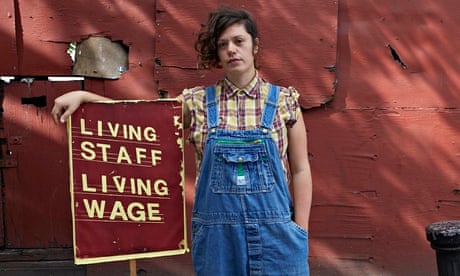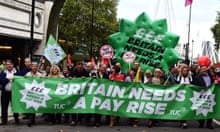On a beach in north Devon a group of women demonstrate their skills with hula-hoops as part of a fitness class led by Marcela Almond, 35. She is one of the new self-employed, a group of people often viewed as another sign of the reviving fortunes of the British economy.
Employment continues to rise, while unemployment fell to 6.4% last month, the lowest since 2008. Part of the story of the growth in employment is that 40% of the jobs created since 2010 are the result of a shift to self-employment, making the UK the self-employed capital of western Europe.
Almond wasn't always self-employed. She was a lecturer in the performing arts at Barnstaple College for five years until she was made redundant in November 2012. "For months I couldn't even get a job cleaning," she says. "It was demoralising." In March last year she used £2,000 of her redundancy money to retrain as a fitness instructor and set up her own business, Almond Tree Arts. "I've got a group of lovely ladies, but it's a struggle."
She works two days a week in an office, earning £350 a month, and her classes can bring in £400 a month. But she says: "If it's a sunny day, I may have paid £10 for the hire of the hall and have only two ladies paying £5 each in a class, so it's unpredictable."
Her income as a lecturer was £32,000 a year. Now it's £9,000, without holiday or sick pay and no state benefits. She has remortgaged the house. Her partner, a qualified mechanic, earns £7.50 an hour (one in four people in Devon earn less than the living wage, set at £7.65 outside London and £8.80 in London). "I work 12-hour days and still money is a constant worry. Our boiler broke last year so we had no heating all winter. It looks as if we won't have heating this winter either."
Entrepreneurship is the pulse of a thriving economy but, according to the thinktank the Resolution Foundation, one in four who, like Almond, became self-employed in the last five years would rather work for a boss; their situation is involuntary. As employers use ever more aggressive tactics to reduce labour costs and restrict collective action, productivity is suffering and patterns of employment initially viewed as temporary are becoming permanent. The gap between the richest and the rest widens. This is not unique to the UK.
The lack of money in the pockets of the many – who spend proportionately more than the wealthy – has led many experts to cite it as a fundamental crisis in capitalism. In the US, economists such as Paul Krugman and Robert Reich support the analysis of Thomas Piketty, author of Capital in the 21st Century, which states that squeezing the majority while allowing the richest to accrue unprecedented levels of wealth does not create "a rising tide that lifts all boats". On the contrary, unrestrained capitalism that ignores the rules of fair play in employment destroys its own customer. In his documentary Inequality for All, Reich points out that 70% of the US economy is dependent on consumer spending. The problem is that more and more people have less and less money to spend.
In America, middle-class wages have stayed the same or fallen since the 1970s. American billionaire Nick Hanauer, who describes himself as "one of the ".01%-ers", is now a supporter of the Seattle $15 minimum wage (compared with $7.25 elsewhere in the US). He asks why it is that the CEO-to-worker pay ratio since the 1950s has risen by a staggering 1,000%. He warns: "I see pitchforks … it is the masses that are the source of growth and prosperity, not us rich guys."
This story of wage stagflation and the working poor is just as applicable in Britain. Beyond chancellor George Osborne's talk of economic recovery, the stories are legion of families and communities across the whole of Britain who are only just managing to keep afloat. No matter how often Osborne says it, it doesn't make it true. Large numbers of Britons are not in recovery. The gulf between those getting by and those getting on grows each month.
In the UK, as elsewhere, underemployment, a lack of investment in training and low pay are rife. Forty per cent of part-timers, mainly women, would like longer hours, according to one survey. At the same time, for many on low pay the last several years have seen the cost of living soar as their wage packet has shrunk. On Thursday Unison, among other unions, launched a ballot in England (Wales will follow later) which, if members vote yes, could see in October the first NHS strike over pay since 1982.
Is a fightback beginning? "A main feature of the economy since 2008 is job splitting," says Martin Smith, national organiser of the GMB union. "What was once a 40-hour-a-week job is now often four jobs on zero-hours contracts of 10 hours. Our union was founded to fight to reduce the 12-hour day to an eight-hour day. Now, some employees would give their right arm for an eight-hour day. It's not just the short hours, it's the humiliation. On a 12-hour weekly contract, it's difficult to get a tenancy or a mortgage, and extra hours are at the discretion of the supervisor, a situation that may fuel bullying. Up to eight million people are working in these precarious conditions."
Alec Merriman, 23, from Swansea, graduated in 2012 and now, under-employed, provides marketing and social media management for a single company. Technically self-employed on part-time hours, without holiday or sick pay, he is also working as an intern for £50 a week. He is a "gringo", a graduate in a non-graduate occupation. "I earn about £120 a week, so I can't afford to move out of my parents' house," Merriman says. "I want to be self-employed, but 10 years down the line. My mother is angry at the situation. She knows I could do a good job. A lot of my friends' parents are quite annoyed at the whole scenario."
Aduke King, 24, is cheerful, capable and resilient. She too is a "gringo", with a masters degree in international studies. She graduated two years ago and has applied for more than 150 jobs, with barely a reply. "For friends, a little thing comes up, and that gives you hope, but so far hope hasn't happened for me."
She works in east London at the Hackney Picturehouse, one of 21 arthouse cinemas. She earns £7.20 an hour – plus £1 extra an hour for a week if she meets the mystery shopper and does all that's required, including smiling and selling products such as membership. Her take-home pay is £800-£1,000 a month, depending on shifts, and her rent is £650. "I walk to work and I have an overdraft of £2,000," she says. "The people in the job are lovely, but it's soul-destroying. My mum understands but, as she sees it, I'm not trying hard enough. It doesn't feel that way to me."
The Hackney Picturehouse offers zero-hours contracts, which suit some – those, for instance, who have other projects – but not others. Since October last year its sister, the Ritzy in Brixton, the only unionised cinema in the Picturehouse chain (owned by Cineworld, £31m profits last year), has been negotiating to win the living wage. In April it began industrial action. On Wednesday the staff voted on management's latest offer. Operating profits for Picturehouse Cinemas Ltd rose 31% in 2013 to £1.3m. The wage bill for 252 staff in 2013 works out at £14,554 a head, a rise of 75p a week over the previous year. It is increasingly tough to unionise a workforce, especially in a casualised workplace. Chief steward for Bectu at the Ritzy is Nia Hughes, 32, a photography graduate, who has worked at the cinema part-time for five years. "The company said people just walk through the job, why should we pay more? We told them some stay 10 years. They have a right to dignity and respect at work."
The Ritzy now pays £7.53 an hour. Last week's offer raised it to £8, backdated to October 2013, rising to £9.10 in 2016. On Wednesday, 24 of the staff rejected the offer and 23 accepted. "We knew the offer would be divisive because it appeals to those who are in immediate need for money, and that's tough. But, essentially, the offer still puts us two years behind the living wage," Hughes says. "The management has held out for fear of contagion. If we win, that has to have an impact on staff in other cinemas." This week Bectu and management meet again. The management says: "We are close to finding a resolution".
Mary Locke, 59, has worked full time for the NHS in Birmingham for 21 years. She is a housekeeper on a ward with 31 patients, and a Unison shop steward. She shows me her pay slip. Her monthly basic take-home pay is £1,175.82. More than a third of non-medical NHS staff are paid less than £21,000 a year. NHS staff have not received an above-inflation pay rise since 2009. As a result Locke, in the last four years, is £1,807 worse off and will lose another £401 this year. "Fuel and food is a worry," she says. "My husband retired 14 years ago and has bad health, so I worry about the heating bills this winter to keep him warm. We have 18 months to run on the mortgage. It's eight years since we had a holiday. Things break, they need repair. People have had enough. They see we are going backwards. We have to do something."
The independent pay review body for the NHS recommended a 1% increase for all staff. Health secretary Jeremy Hunt announced in March an unconsolidated 1% increase for 40%, but not for the majority, including 70% of nurses and midwives.
For Locke that means that if, for instance, she works overtime on a Saturday the £58.82p she earns will not have the extra fiver that a consolidated 1% increase would have delivered. "We have hard clinical evidence that if NHS staff feel valued that results in a positive outcome for patients," says Christina McAnea, head of health at Unison. "Why isn't that part of any calculation?"
In November GMB and Paul Heaton, former lead singer with the Beautiful South, resume a tour of Next shops in which an asbo is presented to store managers for "failing to make work pay". The company says 30% of jobs are for 12 hours or fewer a week. It currently has 1,200 vacancies – 45% temporary posts, 55% permanent – with 30 applicants for every job advertised. When labour is in surplus it is hard for collective bargaining to make any headway. Pay is £6.70 an hour for an adult, plus an average 6% bonus every month. The company argues that a large number of people like 12-hour contracts, such as "mums fitting in childcare". In 2013, according to the High Pay Centre, Next chief executive Lord Wolfson received £4.6m while his staff typically took home £10,000 a year – 459 times less than their boss. The disparity would have been greater if Wolfson, for the second time, hadn't chosen to waive a bonus and share his £3.8m among the company's staff.
Huge income disparities and increased casualisation of the workforce also means higher costs for the taxpayer subsidising low wages. Research last year by Landman Economics showed that the cost to the exchequer of millions of workers paid less than the living wage – "wage dodging", as the GMB calls it – is £3.23bn a year in social security spending and lower tax receipts. In a paper published last month, academics Dr Lydia Hayes and Professor Tonia Novitz considered how the cake could be sliced more fairly. They say economic inequality was at its lowest when 58% of workers were in trade unions and 82% of wages were set by collective bargaining. By 2012, 26% of the workforce was in trade unions and only 23% covered by collective bargaining, while the gap between top earners and the lowest is higher than at any time since records began.
Among the recommendations Hayes and Novitz make is sectoral bargaining to set terms and conditions across particular industries, and the right for employees to join a union without repercussions. Other proposals from the High Pay Centre include worker representation on company boards, remuneration committees, a maximum pay ratio and a legally binding target for the reduction of inequality.
In Devon, Marcela Almond is at a loss. "I don't know where to go from here. Would we like a family? God, yes. But we can't afford to support ourselves at the moment, let alone a child. This just isn't working."











Comments (…)
Sign in or create your Guardian account to join the discussion